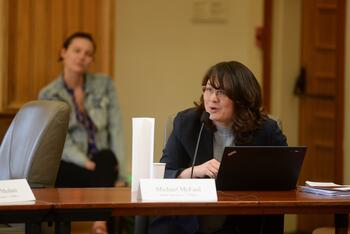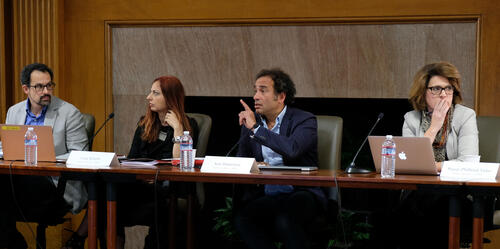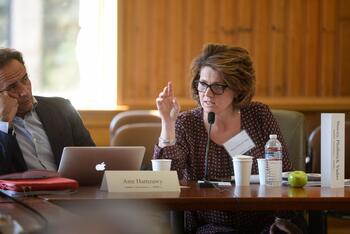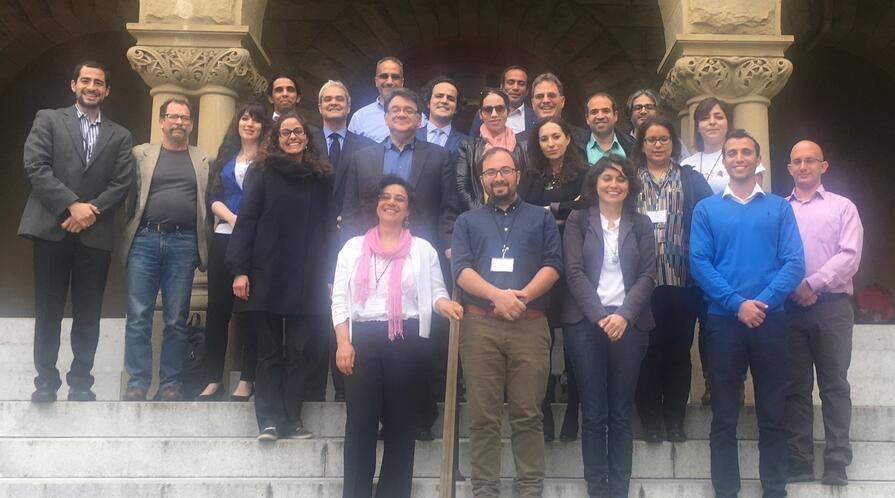[This article originally appeared in Orient XII.]
Political observers have voiced contrasting opinions about the peace treaty between Israel and the Arab Emirates. Some have seen it as a monumental betrayal, others as an historic breakthrough. Actually, the treaty changes nothing in the Middle East political equation, nor does it attenuate in any way the tragic disregard for the rights of the Palestinians which we have witnessed for so many years now. It is simply a strategic arrangement which has short-term advantages for the United Arab Emirates, Israel and the United States but addresses none of the basic issues.
First of all, this peace treaty cannot be regarded as an historic betrayal of Arab positions. The UAE have been working for years to normalize their relations with Israel. The two countries have established high-level contacts in capitals all over the world and have made it known to the international community by organizing their own leaks: they have also sent signals to Western and Arab public opinion. In recent months, the UAE conveyed humanitarian aid to Palestine via the Ben Gurion airport, in co-ordination with Israeli authorities rather than with their Palestinian counterparts. The peace treaty is a normal, organic stage of this process. True, from a legal point of view, it is a decision which goes counter to the Arab peace initiative of 2002. But this latter had already been abandoned just as the Arab League’s sponsorship which went along with it had already been discredited.
At the same, brutal as it may seem, this agreement does not constitute a betrayal of the Palestinians. Their rights have already been sacrificed in the face of Israel’s determination to destroy any prospect of a Palestinian State by laying siege to the Gaza Strip and by gradually annexing the West Bank. The Palestinians have understood that in the Gulf, only Kuwait and Qatar are determined to reject any US sponsored “deal of the century” unless those Israeli policies are abandoned. Though the peace treaty does contain a clause theoretically putting an end to that territorial colonization. It only stops the annexation legally and formally while backing de facto the pursuance of the illegal colonization process.
Nor is the peace treaty an historic breakthrough. The Palestinian struggle has lost much of its political importance in the eyes of the Arab masses during the last three decades. And though it is still capable of sparking an emotional response and remains apolitical issue for Arab public opinion, it generates much less solidarity that it used to do.
DECLINE OF THE PALESTINIAN CAUSE
This decline has taken place in several stages. The first phase began with the Oslo peace process, which obliged the Palestinians to renounce many of their rights in exchange for the vague promise of a future state, meant to be the fruition of a peace process negotiated under the auspices of the international community. The second phase began with the US invasion of Iraq in 2003. By destroying a traditional Arab power, the United States opened the way for Iranian expansion, the new disruptive element in the geopolitics of the region. In the years that followed, Iran considerably extended its strategic power in the Middle East.
Iranian military expansion climaxed in 2013 with the battle of Al-Qusayr in Syria. Before the Syrian civil war began, the UAE and Saudi Arabia, both members of the Sunni axis in the region, faced off against Iran in low intensity clashes in the Gulf area. Al-Qusayr inaugurated a new era in which Iranian military forces could operate openly in Arab countries and provide support for regimes that are their allies. Not only Syria and Iraq, but also Lebanon and Yemen have become arenas of confrontation, fueled as much by sectarian hyperbole as by the principles of realpolitik.
The Sunni Arab states, which form the so-called “moderate” axis in the Middle East, regard such non-governmental actors as Hezbollah, the Houthi movement in Yemen and the militias of the Popular Mobilization Forces in Iraq as auxiliaries in the Iranian war effort. In this context, the containment of Iran comes before the defense of the Palestinians.
The third event which has relegated the Palestinians to the sidelines of regional geopolitics was the Arab Spring. This foregrounded the issues of democratic emancipation and the overthrow of authoritarianism in many countries. The uprisings showed the extent to which the major ideologies of the past, pan-Arabism or its successor, Islamism, had lost much of their emotional appeal with Arab public opinion. Thus, the Palestinian cause became less visible, except in countries hosting large numbers of Palestinian refugees, like Lebanon and Jordan.
Yet while the Palestinians no longer figure high on the foreign policy agenda of most Arab states, the Arab world is certainly not about to plunge headlong into a collective normalization of relations with Israel. The big Arab countries would be likely to meet with strong public resistance. On the other hand, Bahrain, Oman and Mauritania are prepared to follow in the footsteps of the Emirates, and a modest “bandwagon” effect is not out of the question: other Arab countries could become involved in asymmetric exchanges with Israel in order not to be left out of any future settlement and to stay in the good graces of the USA. Short of complete diplomatic recognition, these steps might include the opening of liaison offices and the authorization of bilateral tourism.
For all these reasons, the peace treaty represents neither a tragic betrayal nor an historic breakthrough. From a strategic point of view, it is a calculated move meant only to offer short-term advantages to the three parties concerned.
THE UAE AND THE PRESERVATION OF A COUNTER-REVOLUTIONARY FRONT
From the UAE viewpoint, the treaty allows them to stand firm at a time when the Arab counter-revolution is in difficulty and imperils their reputation. Since the Arab Spring, the Emirates, along with Saudi Arabia, are at the forefront of the region’s countries which regard the propagation of democratic uprisings in the Middle East as an existential threat. The UAE are the leader of this counter-revolutionary front which advocates a Middle East of stable authoritarian regimes in which their petroleum resources guarantee them a decisive influence. According to this world view, electoral Islamism and political liberalism are two sides of the same coin; both represent radical changes which endanger the internal legitimacy of these regimes. It was the UAE that launched the counter-revolutionary battle and they cannot afford to lose it.
Recently, however, they have begun to lose ground. The Yemeni conflict has turned into a humanitarian disaster.
The over-confidence placed in certain factions to carry on their proxy war, as with General Khalifa Haftar in Libya, has not been repaid on the battlefield. As with the unwise embargo against Qatar, their diplomatic adventurism did not achieve its goals. Their investments in Egypt, aimed at making the Abdel Fattah Al-Sisi regime a model of the new Arab stability, have also failed to extricate the country from its political and economic stagnancy. In short, there is too much chaos and considering the initial investment, a rate of return much too low.
Considering all this, the peace treaty with Israel represents a calculated strategic consolidation. The leadership of the UAE hope to use Israel as a more powerful vector to help them achieve their geopolitical objectives, just as they used Saudi Arabia in the first phase of their counter-revolutionary thrust. The UAE are also protecting themselves against another threat: the shock wave that could result from an internal conflict in Saudi Arabia which would neutralise Mohamed Ben Salman. If this were to occur, the UAE leadership would find itself completely isolated.
Thus, the alliance with Israel offers the UAE some degree of protection in view of their common interests. Both countries share a deep hostility towards Iran and reject the nuclear agreement signed by former US President Obama. Both are equally disappointed by President Trump’s refusal to launch a large-scale military campaign against the Iranian forces. The lack of Trump’s military response in July 2019 after the attack on the Saudi Aramco oil facilities was seen as highly significant. And besides, Israel harbors a silent aversion to the democratization of Arab countries.
ISRAEL SAVES FACE
For Israel, the real advantage of this treaty is not economic. The Emirati leadership will make flashy investments in Israel, if only to show the Palestinians what they missed by turning down the “deal of the century”. But at the end of the day, the financial advantages for Israel will be slender. Trade with the UAE will be overshadowed by the existing exchanges with the USA and the West in general, while conversely the oil-rich UAE have no particular need of Israeli investments.
But Israel benefits from the agreement in other ways. First of all, it adds a little more legitimacy to its role in the regional order of the Middle East, even though it does run the risk of being sucked into the impulsive counter-revolutionary actions of its new peace partner.
Above all, however, Israel can go on pulling the strings in the Palestinians situation. Despite the passing mention in the treaty of a halt to the West Bank annexation process, the Netanyahu government considers this to be merely a temporary pause. The “deal of the century,” drawn up by Donald Trump’s entourage having bogged down this year, in view of the international condemnation of the annexation of the Jordan Valley, this new peace treaty provides an ideal opportunity to save face. Actually, no Israeli colony has been dismantled and no land has been returned to the Palestinians. Yet since the annexation plans have been officially suspended, the Palestinian Authority must remain operative as a political player, which preserves the fiction of a peace process in a bilateral framework.
A PUBLICITY OPERATION FOR TRUMP
A treaty like this is grist to the American mill because it is an excellent PR operation at a time when the presidential campaign is in full swing. The agreement can be passed off as a victory for the Trump administration, and the President can score some points as a successful negotiator. The fulfilment of the White House dream of hosting a peace treaty between Israel and an Arab country provides Trump with an excellent diversion to make voters forget his many governance failings in such areas as the coronavirus pandemic, race relations and other domestic issues.
The peace treaty also serves to hide the fiasco of the “deal of the century.” By claiming to have blocked the controversial annexation plans, the US will try to revive this moribund framework. At the same time, it helps Trump prop up his reputation with certain portions of his electorate. It enables the administration to recover a degree of credibility among liberal Jews who aspire to a collective peace in the Middle East while at the same time reassuring rabid Zionists that Israel’s claims to the West Bank are still on the table.
TOWARDS A “PALESTINIAN SPRING”?
In the last analysis, the real losers here are, as usual, the Palestinians. They will keep up their struggle to obtain the constituent elements of a viable state which include the right of return, a capital in East Jerusalem, and the end of Israel’s illegal occupation of their land. While the UAE, Israel and the USA may derive some short-term advantages from this treaty, the long-term future of the Palestinians is still up in the air.
Left at the periphery of the regional power play, the Palestinian struggle needs a fresh uprising. It is to be hoped that it will not take the form of yet another Intifada but rather that of a Palestinian version of the Arab Spring. This would require a rejuvenation of the Palestinian political establishment, the rise to power of a more responsible and better representative leadership, backed by united resistance on the part of Palestinian society as a whole.
This would also require that the Palestinians appeal to the whole rest of the world, not just the Middle East, because international support for a Palestinian State is still extremely high. Today the recovery of their rights by the people of Palestine is probably not linked to the two-state solution which is indeed no longer a viable option but must be sought henceforth in the framework of a single state.






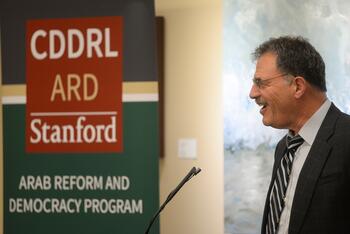
 Farah Al-Nakib (right) and Michael Herb (left)
Farah Al-Nakib (right) and Michael Herb (left)

